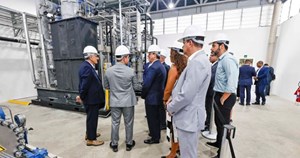News
H2 station from ethanol begins testing phase at Cidade Universitária in SP
USP is developing tests for the world’s first experimental station dedicated to the production of renewable H2 from ethanol. The project, led by the University’s Center for Research and Innovation in Greenhouse Gases (RCGI), represents a milestone in the search for clean energy solutions and the transition to a low-carbon economy.
During a visit to the plant on February 19, the governor of São Paulo, Tarcísio de Freitas, highlighted the importance of the initiative for the state’s economy and its potential for expansion. “The Center for Research and Innovation in Greenhouse Gases at the University of São Paulo represents one of the forces that allow our state to lead the energy transition in Brazil: scientific research. In addition, we have water availability, the largest and best infrastructure in the country and a qualified workforce that qualifies us to be partners in the production of clean and renewable energy for other states and also abroad. We are taking advantage of the potential of sugarcane to develop solutions that will transform and impact entire industries, such as transportation,” noted the governor.

With an investment of $2.7 MM, the station is located at Cidade Universitária, in São Paulo, and is part of a Research and Development project that has the collaboration of large companies and institutions, such as Shell Brasil, Raízen, Hytron (now part of the Neuman & Esser Group), Senai CETIQT and USP itself, through RCGI, in addition to Toyota, Hyundai, Marcopolo and the Metropolitan Urban Transport Company of São Paulo (EMTU). The technology developed aims to demonstrate the viability of ethanol as a vector for the production of sustainable H2, taking advantage of the infrastructure already existing in the country.
The pilot plant has the capacity to produce 100 kilos of H2 per day, a volume that will be used to fuel three buses and two light vehicles, among others. The H2 generated will be tested in USP public transport buses and in Toyota Mirai and Hyundai Nexo vehicles, both powered by H2.
USP’s rector, Carlos Gilberto Carlotti Junior, also celebrated the development of tests and highlighted the importance of the project: “The role of universities is to develop technologies that do not yet exist to allow Brazil to make an energy transition and, with this, position itself as a first-world country. If we can offer cheaper energy with a smaller carbon footprint, we will certainly be world leaders. To achieve this, it is essential that universities generate knowledge and that companies believe in and invest in the industrialization of these ideas. Great technological advances began this way: with academic research transformed into innovation for society.”
The current phase will assess the conversion rate of ethanol into H2 and the fuel consumption and efficiency in vehicles. “We are promoting a revolution in the energy matrix by demonstrating that it is possible to produce sustainable H2 from ethanol, with great logistical efficiency,” emphasized Julio Meneghini, scientific director of RCGI. “Brazil has unique conditions for this development, considering our already consolidated infrastructure for ethanol. This opens up possibilities for the decarbonization of the industry in sectors with high levels of emissions, such as the steel and cement industries, as well as the chemical and petrochemical sectors, in the production of fertilizers and in the large-scale transportation of cargo and passengers.”
H2 production at this pilot plant occurs through the steam reforming of ethanol, a chemical process in which ethanol reacts with water at high temperatures, resulting in the release of H2. This method stands out for its efficiency and the possibility of reducing carbon emissions, since the CO₂ released in the process is biogenic, that is, it can be offset in the sugarcane cultivation cycle.
The deployment of the experimental station paves the way for the advancement of sustainable mobility. Aircraft manufacturers and truck and bus manufacturers can directly benefit from the initiative, as they will have access to an important and sustainable source of H2 for the development of fuel cell-based technologies.
“The promotion of this technology can bring enormous benefits to Brazilian industry. The availability of H2 on a large scale is essential to enable advances on several fronts, from mobility to the production of sustainable fertilizers,” Meneghini highlighted. Based on the results of this Research and Development project, we hope to obtain data that can guide future studies on its application on a larger scale. “Our goal is to demonstrate the potential of this solution and generate technical and scientific knowledge about its viability, taking advantage of the ethanol infrastructure to enable the production and distribution of renewable H2,” explains the director, who also sees the advancement of the USP experimental plant as a significant step towards the production of sustainable H2 in Brazil: “The technology will help consolidate the country as one of the world leaders in the production of clean energy, reducing dependence on fossil fuels and boosting several economic sectors in a sustainable manner.”
Source: USJ Journal

